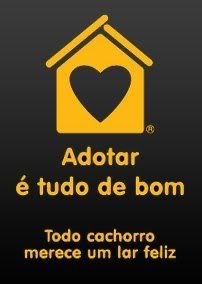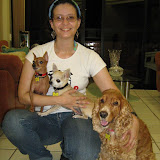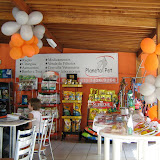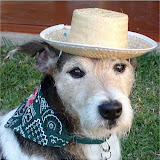I recommend you teach [your dog] a "settle" command. This is basically very similar to a down/stay, except the difference is, he's allowed to move and squirm as long as he doesn't leave his place or get up. Start out slowly, just a minute or two, but eventually you want to work up to 1/2 hour settle times. My female was fine with this, but my male, even though a year older and more mature had a VERY tough time with this lesson - creeping and squirming the whole time he was in a settle. Think of this as teaching patience for dogs.
This exercise will achieve two things. It allows you to reward your dog for being quiet, teaches the dog that it's not ok to always be revved up (unless being tired out), and gives you a command to use when Max is getting too over stimulated and you need him to chill out for a while. It's a wonderful tool - great for use when someone comes to visit that you don't wan accosted (like elderly grandparents for example - or the cable repair guy).
So get yourself a pillow or rug - something you can designate as Max's quiet place - somewhere that you will be able to easily put him back to if he gets up (which he will - often for the first several times you do this). Make it somewhere that he will still be part of the action, but where he must be quiet during a designated time (totally different than crate time BTW). We have pillow stationed near the sofas and I did "settle" practice during dinner, since that was the only time I was actually still long enough to do a 30 min practice. Make sure you come up with a release word that will indicate to Max when his settle time is done - we use "ok" around here.
There is this idea among many that in order to have a quiet dog, that you need to run them until they are worn out. Well, the flaw in this idea is two-fold - one, it creates a dog that is always active until he's tired, and the more you exercise, the longer it takes to get the dog worn out - It's actually impossible at this point for me to wear my dogs out - the best I can hope for is to take the longing and the edge off of them after a good hike, bike ride or swim. 8mos is not too early for Max to do the whole 30 mins either, my female was doing it at 12 weeks, I didn't learn this wondrous trick though until my male was already over a year, but he adapted quickly.
I now have dogs that if they start getting too wild in the house, I can simply send them to their settle places for a little while to unwind. I also use "hush" if they start getting too noisy in their play, since I work from home, and trying to talk with customers with a pair of yowling wolves in the house can be a bit of a challenge - they will actually respond to a snap of my fingers now if they start getting too noisy in their play - of course, my two aren't big barkers to start with, but I know exactly that pleading bark of "pleeeaaaassssseeeee play" - as both of mine are experts - on top of that my dang female is a very growly player. "Hush" works to quiet them at least temporarily - which was simply trained by giving a harsh word and a look - it's enough to alter their train of thought for a second and break their "fun bark" cycle.
[Escrito por Denise Parsons em 2 de janeiro de 2006 para a lista Petdogs-L do Yahoo Groups]
[Your dog] needs more to do. As working dog I would suggest he needs more brainwork rather than physical activity which he seems to be getting enough of. I can remember our trainer telling us a story about an off the wall very high energy Springer that she had. She used to get up at 4 in the morning and hike for miles with the dog before work, just to try and wear it out a bit. All she got was a very very fit dog with off the wall high energy. Someone suggested that as she was up so early anyway she take on a paper route. She tried it out - taking the dog with her and having him practice a 'sit stay' or 'down stay' at every house as she delivered the paper up to the house. She went 1/4 the distance she used to and the dog was much more tired and docile from doing brainwork than she could ever get him from walking.
If the weather is bad I give my dogs 'brain jobs' inside the house to settle them down. Things like 'find the bunny' where I hide little treats everywhere for them to find on cue - nose work is very tiring. I might put a treat in a box or egg carton or plastic bottle and tape it up and they have to figure out how to get it out. I make them practice all their 'tricks' from long stays, to 'wave', to heel, to jumping on and off the couch on command. 1/2 to 3/4 hour of that and they are ready to flake out for hours. You could teach him jobs to do - fetch slippers, turn lights on and off, put all the toys back in the toybox - whatever. If he is sufficiently brain and body exercised and was still barking at the other dog just to be a pest I would probably just take him into his crate for a 5 minute time out every single time he did it. He would soon learn that it was not a very rewarding behavior.
[Escrito por Joan Skeet em 2 de janeiro de 2006 para a lista Petdogs-L do Yahoo Groups]
There are a few things you can do to help [your dog] through this stage which, at this age [8 months old], can be quite obnoxious - really!
1. Work on self-control exercises. Use a lot of Premack for training these. (Basic Premack = You eat your veggies - you can have dessert).
2. Settle exercises are good but they won't be enough. I would still work on them, though, as you will need them later. You can teach a conditioned relaxer. Done right, you can pratically put a dog to sleep.
3. [Your dog] could use a job. Any job. Teach him, though educational games, that doing different jobs are fun and very rewarding. There are tons to pick from.
4. Increase his exercise. A tired puppy is a good puppy and [your dog] is STILL a puppy! I would suggest you start him with road work. GSDs [German Shephard Dogs] LOVE road work. You have to start very slowly. If you want, I could meet with you and show you the best way to get started (if you are not familiar with road work). Also, you can do lunging (as in exercises horses) which will benefit.
5. Teach [your dog] that the only way he can physically play with the Whippets is to do it from a DOWN. Nika does this when she plays with Sushi due to Sushi's size and for safety reasons. It's a more gentle way to play. I use Premack. When Nika gets up, the play ends. IOW, the only way she gets to play with Sushi is if she is in a down position. Be consistent and this works. She is allowed to play any way she wants with Sonny or Dance but NOT Sushi. She was taught this from day one when I got Sushi.
6. Geriatric dogs need to be protected as much as puppies from either adults or rough-playing GSDs that have temporaily lost their brain and you are waiting for it's return. So, make sure that whichever dog you pick for [the puppy] to play with, it's one that is young and can take it. I wouldn't force him or allow him at this age to play with the older dogs if he can't do it in a way that is appropriate for them (you decide what's appropriate). Or... teach him that he can only just 'hang out' with them. When they have had enough of him, remove one or the other, but preferably remove [the puppy] to give the older dogs a break. They will TELL you when they need it.
7. Scenting games will help to do two things: 1) engage the brain and 2) burn up calories which is a good thing to do when the weather is bad and dogs can't spend as much time outside. Tracking is excellent or agility games. It doesn't have to be serious, just play with whatever you have handly around the house. Hide n Seek is a great game as well, either inside or outside. Find Mommy or Daddy is one of Nika's favorite and she prefers it to finding food.
8. Make sure that [your dog] has quality time with you both. Alone. No other dogs. Play educational games, not just retrieve. I have a list of different ones if you want them. Tricks are good to work on during this quality time. GSDs love to work. They need to work.
9. GSDs are velcro dogs. Make sure that you don't have any signs of SA. [Your dog] needs to spend time alone; either in a crate or a room gated off. Give him a knuckle bone or a frozen stuffed Kong to entertain him while he is alone.
10. Tether him to you for a few hours a day. This will keep him out of trouble as well as continue to teach him that you [both] are pack leaders. He will love the extra time with you!
11. Implement the 5/60 rule. He needs it. That's where you train for 5 minutes every 60 minutes. It's a lot of work and dedication but it pays off BIG TIME! Train obed exercises and tricks. Just set a timer for every hour. Obviously, you can only do this when you are home but even those who work outside the home can do this when they come home in the evening.
12. Do commercial training. If you watch any amount of TV, every time a commercial comes on, do a little training. This is 2-4 minutes every 15-20 or so. You don't miss any of the program and [your dog] gets trained just during the commercials. Work a lot on targeting so that he learns to work at a distance which is always more difficult for a GSD b/c they ARE velcro dogs.
13. Introduce him to a restrained down. Once a day do a 30 minute down. NO EXCUSES! I do this while on the computer or watching TV. There is no building up time with this, it's 30 minutes from day one!
There's more you can do but this is for starters! Until the teenager gets his brain back, he's gonna need the two of you to help him.... a lot. I love GSDs!
[Escrito por Cher McCoy em 3 de janeiro de 2006 para a lista Petdogs-L do Yahoo Groups]


















%5B2%5D+532.jpg)

Nenhum comentário:
Postar um comentário